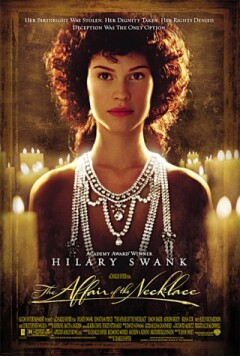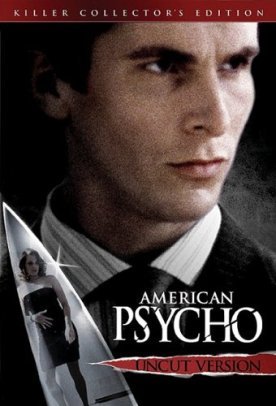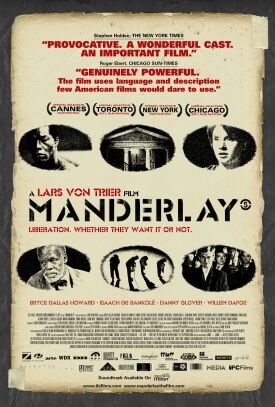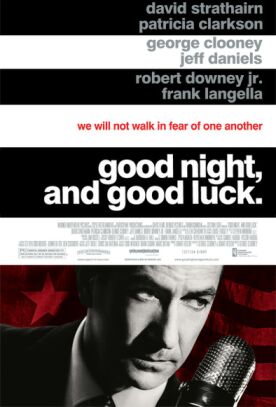Affair of the Necklace, The
The Affair of the Necklace is a lamentable historical epic starring
Hilary Swank as winsome Jeanne de la Motte Valois, a Bourbon bon-bon of the
former royal house of Valois whose family has been dispossessed and her father
killed because he “spoke out against poverty and tyranny.” That he
was also a pretender to the throne does not appear to her to be a relevant
datum. After all, this was the ancien régime when, as everyone
knows, the nobles were piggishly indifferent about poverty and tyranny, and the royals even
more so. That can be — and is — taken for granted. As is the
appalling corruption of their private lives, especially that of the churchmen. The most corrupt of all is of course
Louis de Rohan (Jonathan Pryce), Cardinal of France, who is said to be well-known for his debauchery. That is presumably why we only require one scene of an orgy and one indecent
proposition, plus the odd hint here and there, to establish the fact of his depravity.
Anyway, Jeanne is trying to get her house and lands back, though she is out
of favor at court and her petition will not even be looked at by Marie
Antoinette (Joely Richardson) who, even if she doesn’t say “let them
eat cake” is obviously (here) just the sort of person who would say it. A
subtle courtier, Retaux de Vilette (Simon Baker), is attracted to the young
Countess de la Motte, however, and offers to help her to her goal by insinuating
her into the good graces of the Cardinal, who is desperate himself to have
“Antoinette” smile upon him, as he blotted his copybook with her
years before by some characteristic debauchery conducted at the Austrian
court.
Let’s see. Antoinette won’t speak to Jeanne and she won’t
speak to the Cardinal. So how is the Cardinal to suppose that he will win favor
with Antoinette by employing the services of Jeanne? Simple. Jeanne pretends
that she is an intimate friend of the Queen and can, indeed, induce her to do
all kinds of things she wouldn’t otherwise do. She does this by bribing a
chambermaid to bring her some of the Queen’s monogrammed stationery and
forging letters to herself on it. Naturally the Cardinal, being an unworldly man
of the cloth falls for this ruse. It helps that Jeanne obtains the assistance of
one Count Cagliostro (Christopher Walken doing his comic
“Continental” accent from “Saturday Night Live”), an
alleged seer and mesmerist whom the Cardinal trusts completely. She does this by
threatening to expose him as a fraud. Naturally the Count is terrified.
And then there is an immensely expensive necklace which Antoinette refuses to
pay for because she knows it was commissioned for Madame Du Barry, the mistress
of her husband’s grandfather, Louis XV. The jewelers, facing ruin because
of their outlay for the precious stones get involved when Jeanne sees a chance
to have the Cardinal pay for the necklace (even more improbably thinking that it
will obtain the favor of the queen) and give it to Retaux de Vilette, on her
sole word that he will give it to the queen — whereupon she and de
Vilette, her lover, with the help of her complacent husband, the Comte de la
Motte (Adrien Brody) will sell the diamonds one by one to buy back her
parents’ estate.
Oh dear, oh dear. It is claimed that this is based on a true story, but if so
it is a story so ill told as to be incomprehensible. Unbelievable things do
happen in the world, it is true, but it is the job of the artist to make them
believable, and this Charles Shyer, the director, and John Sweet, who wrote the
screenplay, utterly fail to do. It doesn’t help, I should say, to have
Miss Swank in the role of Jeanne. Though she deserved all the praise she got (if
not necessarily the Oscar) for her role as Brandon Teena in Boys Don’t
Cry, a movie like this shows her to be out of her depth when venturing
beyond Nebraska trailer-trash. True, she is given some truly appalling lines to
speak — as when she says to the Cardinal: “I have heard it said that
Your Eminence is a man of copious desires.” But even if the script had
been better than it is, she looks about as much like a princess of the house of
Valois as, well, Brandon Teena would.
As is usual with movies like this, the worst of it is when it tries to be
serious. The film begins with Jeanne standing before a tribunal of the Estates
General (for some reason called “Parliament” here) after her plot
has been exposed and she and her co-conspirators arrested. Asked if she has
anything to say she speaks as follows: “If I reached for anything that
shone brilliantly it was for a home denied me and a sense of peace I have never
known. Before God and the world, I wanted my life to be as it should have
been.”
Oddly, this is exactly the speech that Brandon Teena might have made had
she/he been given a moment for self-justification before her accusers, and it
goes to the heart of the human condition in turn-of-the-century America. For we
believe implicitly that you can do anything, so long as it is part of an attempt
to make your life “as it should have been.” Jeanne is truly a
heroine for our time. Too bad she is supposed to be living in quite a different
time.
Discover more from James Bowman
Subscribe to get the latest posts to your email.








